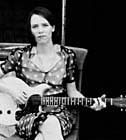
WHO:
Gillian Welch and David Rawlings
WHEN:
Friday, February 26 at 8 p.m.
WHERE:
Bijou Theatre
TICKET INFO:
Tickets Unlimited or 656-4444
|
 |

Gillian Welch plays modern music from the country's past
by John Sewell
The old art versus commerce quandary is a constant vexation of all artistic types, especially in the cynical world of the music business. Lucky for us, there are rare, magic occasions when the bright light of creativity outshines the neon glimmer of the pop marketplace. The ascension of Gillian Welch to national notoriety as an artist of note is such a rare, storybook occasion.
Welch's music transcends any easy classification. Tags such as folk music, bluegrass, Americana, and country could be applied, though none of these are exactly on the mark. Using minimal, acoustic instrumentation, Welch strips her songs down to the bare essence—telling stories of life, death, despair, and redemption. If Flannery O'Connor had been a musician, she probably would have sounded something like Gillian Welch.
"I'd call what I do contemporary acoustic music," says Welch. "American primitive would probably be a pretty close description. When we go to other countries I tell people that it's kind of like bluegrass, only not. We're definitely over on the more old time side of Americana."
Though she is usually dubbed as a solo performer, Welch is always abetted by her musical and songwriting partner, David Rawlings. "We just use my name for convenience," says Welch. "Anyone who has seen us play knows that we're equal partners. When we perform it's definitely a duo."
Welch's latest album, Hell Among The Yearlings (Almo Sounds) mines the darker recesses of the human psyche. Welch says that her next recording probably won't end up being quite as heavy. "I doubt that I could go further in that direction exactly," she says. "The next record will be something a little different because I don't really know how we could cut anymore flesh off the bone. At this point, the songs we've got for the next record are a little more upbeat. So it probably won't be so dark. But I could have a change of heart; everything could go to hell in the next month and the next record could be even more lonesome than the last."
The protagonists of Welch's songs seem to find mortality and gloom at every turn, as well as the foreshadowing of possible salvation. Welch repeatedly uses religious imagery in her lyrics, which she says is just another way of rendering an elemental component of life experience.
"There is lots of religious imagery, but I think I always approach it on sort of an emotional level," she says. "I think the reason that religion comes up so much in my songs is that I love that kind of music. I listen to a lot of gospel music and it's just creeped into my own. I mean, what else are you going to write about? I write about powerful subjects because I think your songs can only be as powerful as the subject matter you're dealing with. It's better to write about death than to write about your last day at the grocery store."
The future looks bright for Welch, who has just finished a productive year of touring and recording. She just returned from her third European trek, where she reports a good reception and newly acquired drawing power. "In a way, our records are more prominent over there than they are here," says Welch. "In England, what we do is considered country music. Americana doesn't exist over there. Everything that's American music is called country, so we're in the same bin with Johnny Cash and Reba McEntire. When we chart over there, we're on the country chart and that's crazy. I was really surprised by that."
Welch is also finding her niche in the hierarchy of Nashville songwriters. Several of her songs have been played by other artists, most notably "Orphan Girl," which was recorded by Emmylou Harris.
"I have a publisher here who pitches my stuff when it's appropriate to more mainstream country artists," says Welch. "I do kind of fit into that world of Nashville songwriters, but for the most part that's kind of like an extra bonus. I never think about that stuff. If someone like Kathy Mattea cuts one of my songs it's just a windfall—like something totally unexpected and nice. I would never actively try to write songs just to make mainstream hits, though."
A new wrinkle for Welch is composing film scores. Welch and Rawlings recently completed recording a couple of songs which will be featured prominently in a forthcoming independent film, A Good Baby. "We just did a couple of songs for this movie and it was really a good time," she says. "One of my favorite records by Bob Dylan has always been his Billy The Kid soundtrack, so we kind of used that as a road map for what a movie soundtrack can be. That's been really fun, and we've enjoyed doing it."
"You won't have heard of the movie, and I'm not even sure if it will come out as a major release," Welch continues. "It's a little independent film that takes place somewhere in North Carolina. It's kind of like they took this Appalachian murder ballad and turned it into a movie. I think that's why they decided to call me."

|